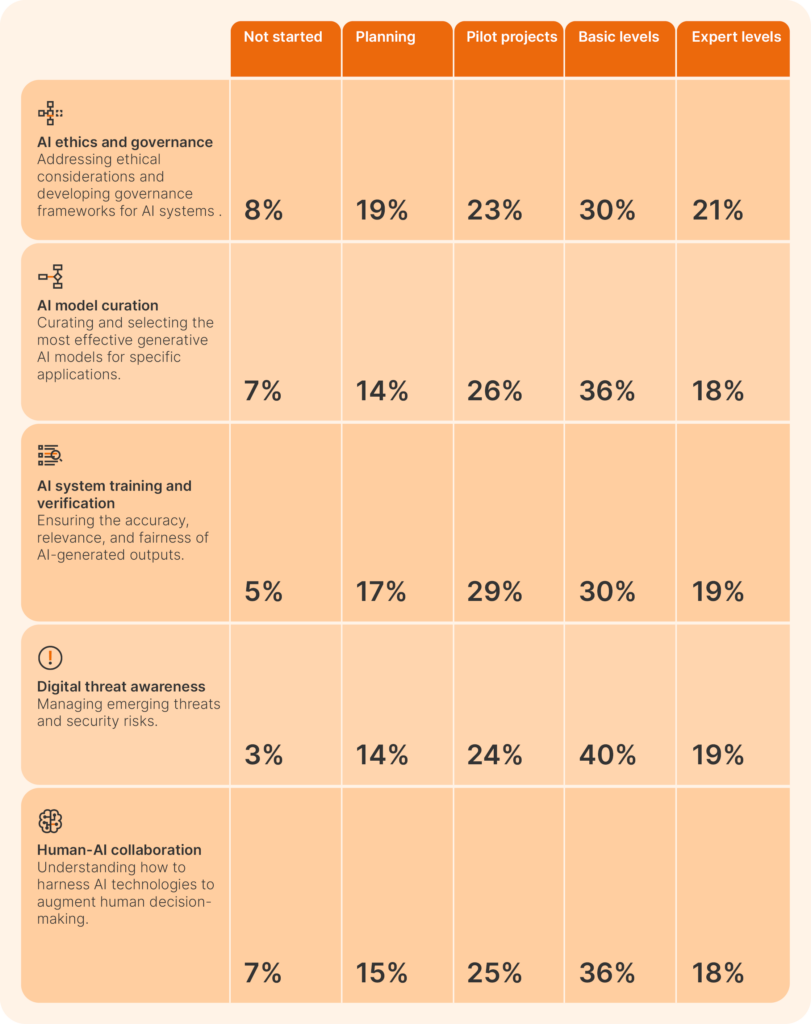Three quarters of German businesses have programmes underway to integrate AI capabilities
IT leaders in Germany believe that more than half of their team’s current tasks will be automated by 2030.
See this press release featured in these publications:
15 December, 2023 — Keller West, the specialist global IT search and recruitment consultancy, today publishes research which reveals that the vast majority of businesses are making solid progress in integrating generative AI into operations and workflows — across a number of AI-related disciplines, more than three quarters of firms already have programmes underway.
Keller West sought the views of senior IT leaders* on their organisation’s progress in rolling out programmes across a range of AI fields, including ethics, governance, system training and human plus AI collaboration. The study found that roughly a third of senior leaders believe their businesses have basic knowledge, a fifth view their level of competence as expert, while around another quarter have started with pilot projects.
Senior IT leaders believed that their organisations had made the most progress in Human-AI collaboration and also in AI model curation – with 54% of respondents citing that they had reached basic or expert levels of competence in these two disciplines; 51% said the same of their advances in AI ethics and governance; with a figure of 49% for AI system training and verification, and digital threat awareness.
Table 1 – Where is your organisation in terms of developing capabilities in the following areas?

Understandably, senior IT leaders see a considerable incentive in advancing their organisation’s AI capabilities — they anticipate that, on average, just over half (51%) of their team’s current tasks will be automated by 2030.
Alex Gerritsen, Partner at Keller West, Germany said:
“It’s encouraging that the vast majority of businesses are well underway with integrating generative AI into operations. We’d suggest that businesses still at the planning stage might want to accelerate their evaluations – although clearly each business is going to want to fully understand the risks and develop guidelines for usage.
Far from AI replacing jobs however, we’re seeing the exact opposite. For one thing, human involvement and oversight is essential in ensuring that AI delivers high-quality, compliant outputs. Secondly, by helping them to get through tedious, routine tasks more quickly, AI frees up knowledge workers to get more done in the areas that matter.
Generative AI is creating new roles as forward-thinking organisations look to capitalise quickly on the technology’s potential, and get a head start on rivals. In other sectors, notably retail and hospitality, businesses have no option but to leverage generative AI as there simply aren’t enough workers in the sector.”
Confidence in building out AI capabilities but this will require upskilling teams
Despite the current shortage of IT talent in the German market (as revealed in a previous Keller West report), IT leaders, unexpectedly, did not see this as a barrier to building out their AI capabilities — 82% were confident of being able to find people with the skills needed to fully capitalise on the opportunities of AI.
In terms of finding those skills, senior IT leaders gave similar weight to four options: 57% of respondents expect to make a senior hire to work with a team and grow its capabilities and competence; 56% plan on developing the capabilities of junior staff; 55% anticipate making junior level hires and have them train on the job with 51% planning to develop mid-level staff for the responsibilities.
Alex Gerritsen said:
“At a senior level, when it comes to finding and recruiting the kind of talent that can help a business to get ahead using AI, many businesses seem to be following a similar path. They start with a host of use cases across multiple departments – sales, customer service, software development, marketing, etc. At this point, the skill set required is fairly general which opens up a bigger pool of talent. Once the business starts to move beyond the theory though and starts honing in on the specific areas where AI can create competitive advantage, they start to need specialist skills, where the talent pool gets much tighter. At that point, it’s useful to turn to external recruitment consultants, who have a detailed understanding of the evolving landscape and a considered view of how specific skill sets match with what the organisation really needs.”
The in-demand technical and soft skills in an era of generative AI
The Keller West study also gave some useful guidance on the technical skills that will be in demand in an era of generative AI: assessing AI solutions and guiding the organisation through selecting and deploying the highest rated, selected by 52% of respondents. This was followed by next generation software development (delivering and harnessing pioneering software to drive business success), cited by 39% and security, trust architectures and identity management, which was chosen by 34%. Extracting value from ever increasing amounts of corporate data was selected by 30%.
The top three soft skills that IT senior leaders expected their businesses to need were creativity (selected by 55% of respondents), teamwork (45%) and problem-solving (43%).
Alex Gerritsen said:
“AI skills are clearly in the spotlight at the moment, but this is going to be an area of competence that is valid across the full range of IT operations. Whether you’re in software development, security, cloud infrastructure or the Internet of Things, IT professionals are going to be using generative AI to automate tedious, routine tasks, to generate new ideas and concepts, and to get work done faster.”
* = For the purpose of this research, senior IT staff are characterised as professionals earning a salary of more than €90,000 per annum.



